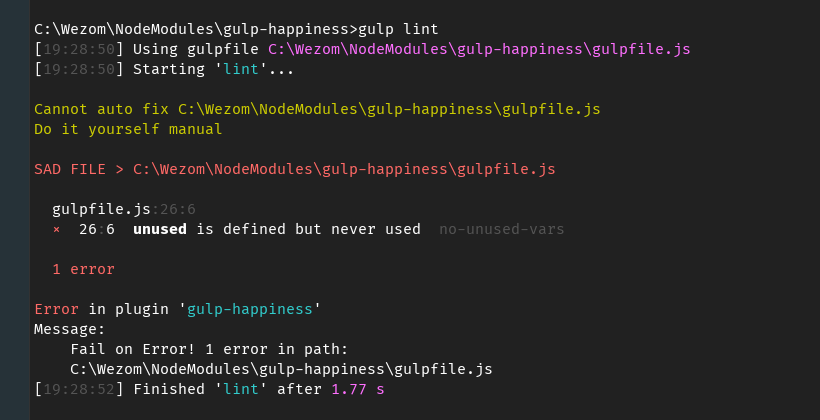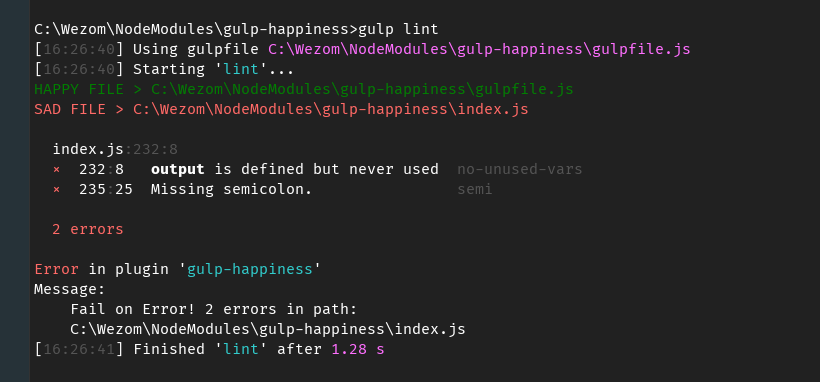
Security News
/Research
Wallet-Draining npm Package Impersonates Nodemailer to Hijack Crypto Transactions
Malicious npm package impersonates Nodemailer and drains wallets by hijacking crypto transactions across multiple blockchains.
gulp-happiness
Advanced tools
Gulp plugin for happiness
npm install --save gulp-happiness
# or using yarn cli
yarn add gulp-happiness
Check out files with happiness linter
const gulp = require('gulp');
const gulpHappiness = require('gulp-happiness');
gulp.task('lint', function () {
return gulp.src(['**/*.js','!node_modules/**'])
// Attaches the lint data to the "eslint" property
// of the file object so it can be used by other modules.
// By default it will skip files with empty content
// and if filename starts with _ (underscore)
.pipe(gulpHappiness())
// eslint.format() outputs the lint results to the console.
.pipe(gulpHappiness.format())
// Look after checking all the streamed files,
// and if at least one of them has errors it will fail.
// Note! This method does not transfer files further to the stream!
.pipe(gulpHappiness.failAfterError());
});
Lint files, fix and transfer
const gulp = require('gulp');
const gulpHappiness = require('gulp-happiness');
gulp.task('lint', function () {
return gulp.src('./src/scripts/**/*.js')
// Enable fixing - fix: true.
// If auto fixing cannot be done,
// you will see message in console about it
.pipe(gulpHappiness({
fix: true
}))
// Show in console happy files ;)
.pipe(gulpHappiness.format({
showHappyFiles: true
}))
// Failing if file has eslint errors,
// it will break task immediately.
// Current file and all next not will be transferred
.pipe(gulpHappiness.failOnError())
// transfer files
.pipe(gulp.dest('./dist/assets/js/'));
});
No explicit configuration.
Linting with default options.
Attaches the lint data to the "eslint" property of the file object so it can be used by other modules.
type boolean /
default undefined
Fix most issues automatically if set true.
Note! It will not fix original files in your fs.
It will fix files in stream and you must save them where you need by using gulp.dest() after linting
Note! If auto fixing cannot be done - you will see message in console about it.
Example of log:

type Object /
default undefined
Options for happiness linter
type Array.<string> /
default undefined
Custom global variables to declare (e.g. ['jquery', '$'])
type Array.<string> /
default undefined
Custom eslint plugins
type Array.<string> /
default undefined
Custom eslint environment
type string /
default undefined
Custom js parser (e.g. 'babel-eslint')
type boolean /
default true
File which name starts with _ (underscore) will be skipped and not using in stream next.
You will receive message in console if it happens.
Example of log:

type boolean /
default true
File with empty content will be skipped and not using in stream next.
Note! Spaces, tabs and newlines will be treated as empty content.
You will receive message in console if it happens.
Example of log:

type boolean /
default undefined
No logs about noEmpty and noUnderscore files
No explicit configuration.
Outputs the lint results to the console.
Default formatter is eslint-formatter-pretty
type string
You can use formatter by default
gulpHappiness.format('default') - same as gulpHappiness.format()
or use one of the ESLint-provided formatters,
for example gulpHappiness.format('stylish')
or use some else formatter which you can install from npm https://www.npmjs.com/search?q=eslint+formatter
Example
npm i --save eslint-friendly-formatter
const gulp = require('gulp');
const gulpHappiness = require('gulp-happiness');
gulp.task('lint', function () {
return gulp.src(['**/*.js','!node_modules/**'])
.pipe(gulpHappiness())
.pipe(gulpHappiness.format('eslint-friendly-formatter'))
});
type function
Parameters:
| Name | Data type | Description |
|---|---|---|
results | Array | Results of eslint |
formatterOptions | Object/undefined | Options for formatter |
You can use own function or existing formatters as function https://www.npmjs.com/search?q=eslint+formatter
Note! Function will receive results array from eslint data for formatting.
And it is must return output as string if has problems in received results for console or some negative value, e.g. null | undefined | false | '' .
Example with custom formatter function
const gulp = require('gulp');
const gulpHappiness = require('gulp-happiness');
gulp.task('lint', function () {
return gulp.src(['**/*.js','!node_modules/**'])
.pipe(gulpHappiness())
.pipe(gulpHappiness.format(function(results, formatterOptions={}) {
// process results and options
// ...
let output = myOwnMethodForTransformResults(results, transformOptions);
return output;
}))
});
Example with installed formatter function
npm i --save eslint-friendly-formatter
const gulp = require('gulp');
const gulpHappiness = require('gulp-happiness');
const eslintFriendlyFormatter = require('eslint-friendly-formatter');
gulp.task('lint', function () {
return gulp.src(['**/*.js','!node_modules/**'])
.pipe(gulpHappiness())
.pipe(gulpHappiness.format(eslintFriendlyFormatter))
});
see above formatterName and formatterFunction
type Object /
default undefined
Options for the chosen formatter
type boolean /
default undefined
Show files without problems in console
Example of log:

Same as gulpHappiness(options) → options.noUnderscore
Same as gulpHappiness(options) → options.noEmpty
Same as gulpHappiness(options) → options.silent
No explicit configuration.
type boolean /
default undefined
Not fail on errors
type fucnction /
default undefined
Parameters:
| Name | Data type | Description |
|---|---|---|
errorMsg | null/string | Is null if no errors were found and is string if errors were found. String contains a short message about errors |
eslintData | Object | eslint data from file |
Its call will be before ending of pipe. So you don't need apply no callbacks or return some values.
You can use it for own custom actions, e.g rewrite some globals.
Note! Even if options.disabled - is true - this function will be called
Same as gulpHappiness(options) → options.noUnderscore
Same as gulpHappiness(options) → options.noEmpty
Same as gulpHappiness(options) → options.silent
No explicit configuration.
Same as gulpHappiness.failOnError(options) → options.disabled
type fucnction /
default undefined
Parameters:
| Name | Data type | Description |
|---|---|---|
errorMsg | null/string | Is null if no errors were found and is string if errors were found. String contains a short message about errors |
errorFilesPaths | Array | Array of files with errors. It will an empty if no files. |
allErrorsCount | number | Count of all errors. Will be 0 if no errors |
Its call will be before ending of pipe. So you don't need apply no callbacks or return some values.
You can use it for own custom actions, e.g rewrite some globals.
Note! Even if options.disabled - is true - this function will be called
Same as gulpHappiness(options) → options.noUnderscore
Same as gulpHappiness(options) → options.noEmpty
Same as gulpHappiness(options) → options.silent
npm test for testing code style and run mocha testsnpm run happiness-fix for automatically fix most of problems with code stylePlease read CHANGELOG.md
Please read CONTRIBUTING.md
FAQs
Gulp plugin for happiness
The npm package gulp-happiness receives a total of 0 weekly downloads. As such, gulp-happiness popularity was classified as not popular.
We found that gulp-happiness demonstrated a not healthy version release cadence and project activity because the last version was released a year ago. It has 1 open source maintainer collaborating on the project.
Did you know?

Socket for GitHub automatically highlights issues in each pull request and monitors the health of all your open source dependencies. Discover the contents of your packages and block harmful activity before you install or update your dependencies.

Security News
/Research
Malicious npm package impersonates Nodemailer and drains wallets by hijacking crypto transactions across multiple blockchains.

Security News
This episode explores the hard problem of reachability analysis, from static analysis limits to handling dynamic languages and massive dependency trees.

Security News
/Research
Malicious Nx npm versions stole secrets and wallet info using AI CLI tools; Socket’s AI scanner detected the supply chain attack and flagged the malware.